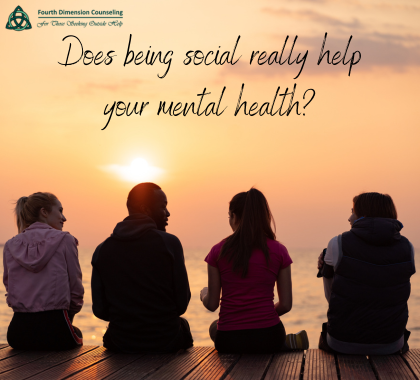 Human beings are inherently social creatures, and our interactions with others play a vital role in shaping our overall well-being. The question of whether being social truly helps improve mental health has garnered significant attention from researchers and mental health professionals.
Human beings are inherently social creatures, and our interactions with others play a vital role in shaping our overall well-being. The question of whether being social truly helps improve mental health has garnered significant attention from researchers and mental health professionals.
How Can Being Social Improve Your Mental Health?
-
Emotional Support:
One of the fundamental benefits of social interaction is the provision of emotional support. Having supportive relationships with friends, family, or a community can provide a sense of belonging, validation, and understanding. Sharing our thoughts, feelings, and experiences with others allows for emotional expression and can help alleviate stress, anxiety, and depression. Supportive social connections can serve as a buffer against the challenges of life, fostering resilience and promoting positive mental health outcomes.
-
Reduced Feelings of Loneliness and Isolation:
Social interaction helps combat feelings of loneliness and isolation, which are known risk factors for mental health problems. Engaging in social activities and maintaining meaningful relationships provides a sense of connection and belonging. Loneliness, on the other hand, can contribute to depressive symptoms, anxiety, and an increased vulnerability to mental health issues. Regular social interaction acts as a protective factor, promoting feelings of connectedness and reducing the negative impact of isolation on mental well-being.
-
Enhanced Self-Esteem and Self-Worth:
Positive social interactions can bolster self-esteem and self-worth. Interacting with others in a supportive and affirming environment can help validate one’s thoughts, feelings, and abilities. Social connections provide opportunities for personal growth, feedback, and validation, which contribute to a more positive self-perception. This, in turn, can lead to improved mental health outcomes, increased self-confidence, and a greater sense of purpose.
-
Stress Reduction:
Social support systems can significantly impact stress levels and our ability to cope with stressors. Engaging in social activities and having a network of supportive individuals can provide emotional and practical support during challenging times. Sharing concerns and seeking advice from trusted friends or family members can help reduce stress and provide new perspectives on problems. The presence of social support can also regulate the body’s stress response, leading to improved overall mental health.
-
Increased Resilience:
Social connections play a crucial role in building resilience—the ability to adapt and bounce back from adversity. Strong social networks can provide a source of strength and encouragement during difficult times. Interacting with others who have faced similar challenges can inspire hope, offer guidance, and provide role models for coping strategies. Social support systems foster a sense of community, promoting resilience and aiding in the recovery from mental health conditions.
-
Improved Cognitive Function:
Engaging in social activities can positively impact cognitive function and mental well-being. Social interaction stimulates the brain, fostering mental agility, and promoting cognitive vitality. Engaging in conversations, debates, and intellectually stimulating activities with others can enhance memory, attention, and problem-solving skills. Regular social engagement can contribute to overall brain health and reduce the risk of cognitive decline.
The evidence overwhelmingly supports the idea that social interaction plays a significant role in promoting mental health and well-being. Engaging in social activities and maintaining meaningful relationships contributes to improved resilience, cognitive function, and overall mental well-being. Recognizing the importance of social interaction and cultivating strong social networks is crucial for nurturing mental health and fostering a sense of belonging and connection in our lives.
More Advice:
- Do I Need to See a Counselor for Love Addiction?
- Simple Ways to Reduce Stress
- Sex Victims Can Experience PTSD
- Emotions and How to Process Them
- Sex Addiction Counseling
- How Do I Know it’s Time to Get professional Counseling?
- How to Heal from Betrayal Trauma
- What is PTSD? – (Government Help)
- The Mental Health Effects of Sexual Abuse
- The 4 Types of Intimacy
- 5 Ways to Reduce Stress
- What is Co-Dependency?
- How Same-Sex Couples Counseling is Different
- How to Know it’s Time to Get Mental Help
- How to Find a Great Relationship Counselor
- What if I Can’t Get in to See a Counselor?
